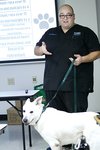SWAN LAKE — Firefighters, law enforcement officers and EMS providers train to respond to any type of emergency situation. With that in mind, the Sullivan County Division of Public Safety hosted …
This item is available in full to subscribers.
Please log in to continue |


SWAN LAKE — Firefighters, law enforcement officers and EMS providers train to respond to any type of emergency situation. With that in mind, the Sullivan County Division of Public Safety hosted a Pet First Aid class at the county’s Emergency Services Training Center last week.
Organized by Sullivan County 911 and EMS Coordinator Alex Rau and Sullivan County Fire Coordinator John Hauschild, the class taught first responders about the proper handling of household pets and other animals, including how to check for vital signs, treat shock and administer CPR.
Dr. Joe D’Abbraccio of Catskill Veterinary Services, who was joined by his canine companion Saber, led those in attendance through basic first aid techniques and some common emergency situations first responders may encounter.
“If we go to a fire or a motor vehicle accident our priority is to treat human patients, but a lot of times people have pets in their home or in a motor vehicle and look to us to do something for the animal,” Rau said. “While there’s certainly more in-depth training that can be had, the Pet First Aid class was phenomenal to give us a quick look at how we can do some emergency treatments if need be.”
D’Abbraccio said he hopes that those who attended that class walked away with a greater comfort and knowledge of how to best care for animals at emergency scenes.
“They of course do not replace veterinary professionals but I feel that they play a vital role in getting animals to the proper professionals,” he said. “I hope to offer more of these classes in the future as well as hands-on lab demonstrations. Such demonstrations include handling and first aid of farm animals as well as more hands-on care of dogs and cats.”
Common emergency situations D’Abbraccio encounters include heat stroke, burns, bone fractures, car accidents, insect bites and stings and poisonings.
D’Abbraccio talked about common toxins that can cause problems for pets, including over-the-counter and prescription medications, household cleaners, pesticides and other potentially harmful substances.
The ASPCA can be reached at 1-888-426-4435 and the Pet Poison Helpline at 800-213-6680. Although not free, both agencies are available 24/7 to assist with any animal-poison related emergency.
D’Abbraccio also discussed equine and large animal emergencies and how first responders can safely approach larger animals without putting themselves in danger.
“It was a good class and I think it will be a foundation for other classes to come,” Rau said.
Comments
No comments on this item Please log in to comment by clicking here